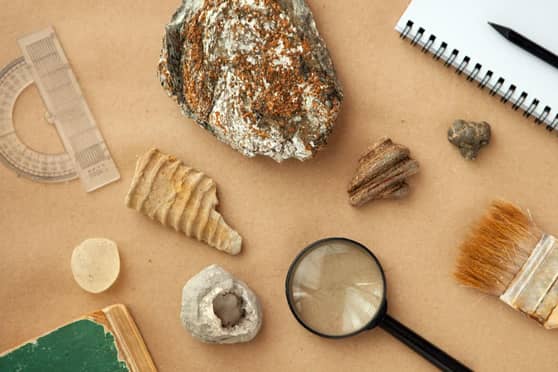Summary
Jadavpur University and Presidency University offer undergraduate courses in Geology
Integrated BSc and MSc programmes are available at institutes like IIT Kharagpur and IISER Kolkata
Geology is a branch of science that studies earth processes like plate tectonics, volcanic eruptions and ocean flows to understand the history of our planet. The better geologists understand these processes, the more efficiently they can predict how such events could influence the future of earth. If your interest lies in this direction, a career in Geology would be the right choice.
Studying Geology
- You need at least 60% aggregate in your Class XII board exams with Physics, Maths and Chemistry as mandatory subjects.
- After that, you need to obtain a BSc degree in Geology along with specialised courses.
- Following BSc, you can join a master's course and then pursue a PhD in specialisations as diverse as Palaeontology, Mineralogy, Volcanology and Hydrology.
- You need to have at least 55% marks in your BSc to pursue an MSc degree in Geology.
- Various institutes conduct entrance exams for their MSc courses. You can also opt for integrated master’s courses.
Top Institutes that offer BSc courses in Geology:
Jadavpur University, Kolkata
Course: BSc in Geology
-
Duration: Three years.
-
Eligibility: You need to complete your Class XII board exams with 60% aggregate in Science stream.
-
Admission: Merit-based. The marks of Maths, Physics and Chemistry will be added to your aggregate score for the final assessment.
-
You can check more here.
Presidency University, Kolkata
Course: BSc in Geology
-
Duration: Three years.
-
Eligibility: You need to complete your Class XII board exams with 60% aggregate in Science stream.
-
Admission: You needed to clear PUBDET (Presidency University Bachelor’s Degree Entrance Test) before the pandemic. For the last two batches, admission was merit-based.
-
You can check more here.
Banaras Hindu University
Course: BSc in Geology
-
Duration: Three years.
-
Eligibility: You need to clear your Class XII board exams or equivalent exams with a minimum of 50% marks in Physics, Maths and any one of Chemistry, Stats, Geology, Computer Science, Information Technology and Geography to appear for an entrance test conducted by the university.
-
Admission: Depends on your performance in the entrance exam.
-
You can check more here.
Indian Institute of Technology, Kharagpur
Course: Integrated BSc-MSc in Applied Geology
-
Duration: Five years.
-
Eligibility: You need to pass your Class XII board examination with 60% aggregate in Science stream.
-
Admission: You have to clear JEE Main conducted by the National Testing Agency (NTA). It’s the preliminary test for JEE Advanced, which is the entrance test for admission to the five-year Applied Geology course.
-
You can check more here.
Indian Institutes of Science Education and Research, Kolkata
Course: Integrated BS-MS Degree in Earth Science
-
Duration: Five years.
-
Eligibility: You need to clear your Class XII board exams with 60% aggregate in Science stream to appear for an entrance test.
-
Admission: You have to clear the IISER IAT entrance exam to get admission to UG courses at IISERs. The exam lasts for three hours and tests students on objective type questions from Biology, Chemistry, Maths and Physics.
-
You can check more here.
Top institutes that offer MSc courses in Geology:
- IIT Kharagpur, West Bengal
- Jadavpur University, Kolkata
- Presidency University, Kolkata
- Banaras Hindu University, Uttar Pradesh
- Indian Institute of Technology, Roorkee
- Indian Institute of Technology, Bhubaneswar
- University of Delhi, Delhi
- Annamalai University, multiple locations
- St. Xaviers College, Mumbai
- IIT Bombay, Mumbai
- Aligarh Muslim University, Aligarh
- Indian Institute of Science Education and Research (IISER), multiple locations
Job roles with a degree in Geology:
-
Marine geologist: They determine which sites contain mineral resources and are safe for extracting natural resources. They plan surveys for geological, geochemical and geophysical data collection to determine facts, principles and reasons.
-
Petroleum geologist: They use cutting-edge technologies like geochemical analysis and sonar systems to locate and quantify the amount of combustible fuel in land or ocean sediments. In the oil extraction mechanism, they collaborate closely with oil extraction companies.
-
Mine supervisors: They are in charge of overseeing and managing mining operations. These professionals are in charge of ensuring mine worker safety, assigning shifts, training workers and maintaining data.
-
Hydrologists: They monitor and analyse the flow, distribution, quality and quantity of underground water. They also work to develop methods for preserving underground water.
-
Geochemist: They examine the age, nature and components of rock, minerals, soil and other environmental samples. They also map specific geochemical areas for research and analysis to offer advice and support to mainstream geologists.
-
Petrologist: Exploration for new oil and gas fields, both onshore and offshore, is carried out. Before drilling, all types of surveys, such as geophysical and seismic surveys, are performed.
-
Seismologist: They study the movement of the earth's tectonic plates. They use seismographs and computer equipment to collect and analyse data on seismic events.
Last updated on 15 Feb 2022

